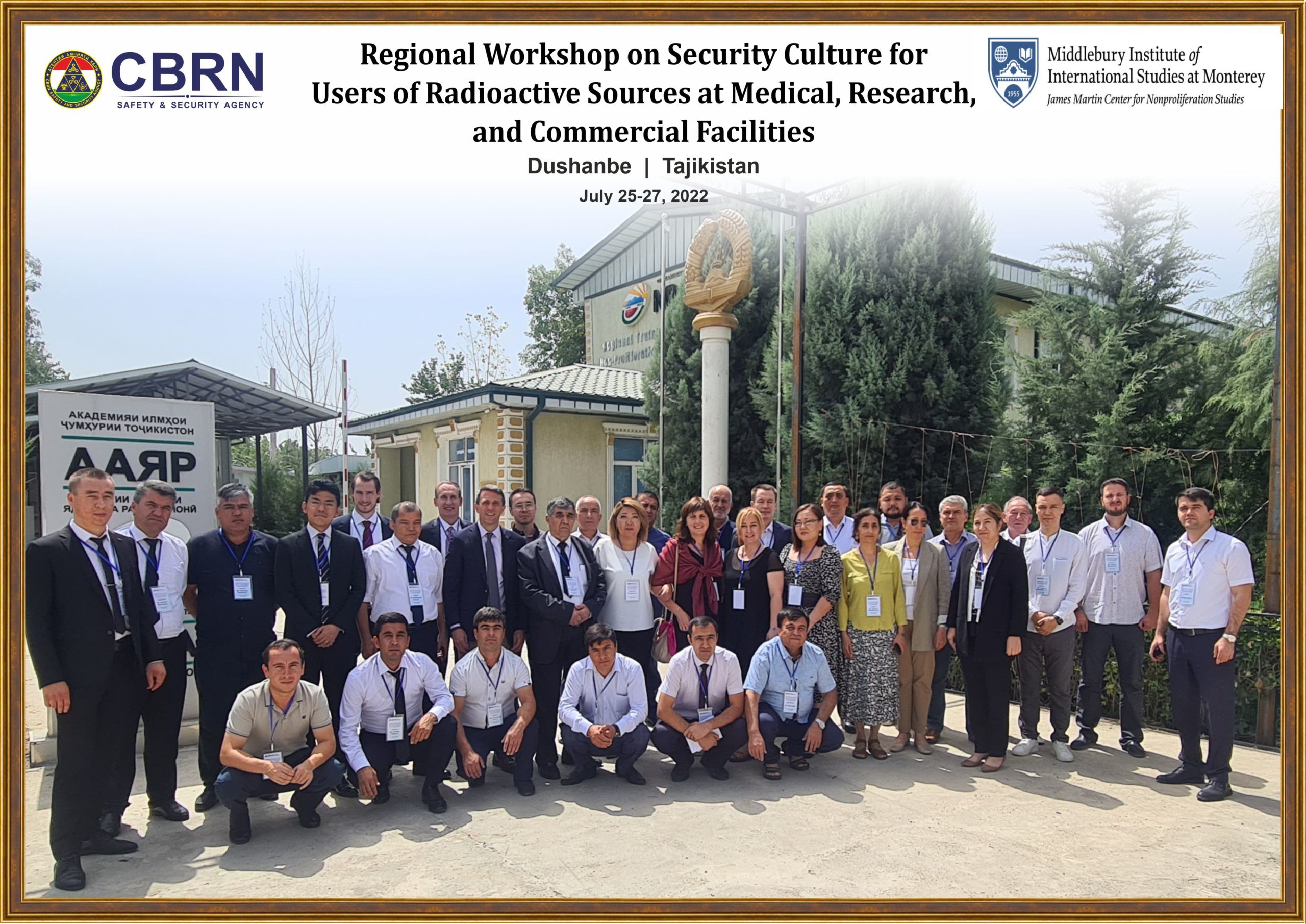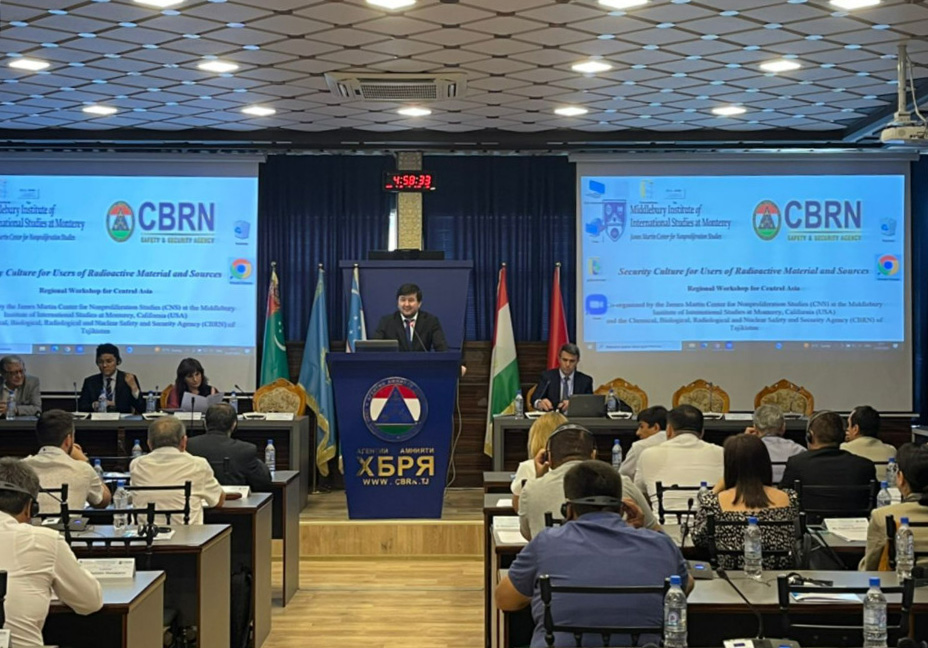August 19, 2022
Margarita Kalinina-Pohl
In August, the James Martin Center for Nonproliferation Studies completed a year-long project on strengthening security culture for users of radioactive material and sources in Central Asia and Azerbaijan. The effort led by Margarita Kalinina-Pohl, was sponsored by the Pacific Northwest National Laboratory (PNNL) with funding from the Department of Energy’s National Security Administration’s (NNSA’s) Office of Radiological Security. It was implemented jointly with the CBRN Safety and Security Agency (CBRN SSA) of Tajikistan.
The project’s goals were to increase awareness about security culture among users of radioactive sources at medical, research, and commercial facilities and recognize its importance; promote interactions between facilities and national regulatory bodies; analyze current attitudes and trends on security culture awareness; introduce an online self-assessment security culture survey; and initiate a network of radiological security culture professionals in Central Asia.
The project included two phases. The project’s first phase included the delivery of a three-day virtual seminar for regional professionals on November 17-19, 2021. The second and final phase concluded with an in-person three-day regional meeting of held in Dushanbe, Tajikistan, on July 25-27, 2022.

Participants of the workshop in Dushanbe, Tajikistan
Project’s Phase 1
The virtual seminar gathered about 50 participants, including experts from Azerbaijan. Kazakhstan, Kyrgyzstan, Uzbekistan, and Tajikistan representing national regulatory authorities, ministries and state committees, medical facilities, commercial facilities, and research institutions.
The program included three parts:
- Introduction of nuclear/radiological security culture for users of radioactive sources and material
- Security culture assessment and insider threats
- Self-assessment security culture introduction and feedback
The agenda featured speakers from CNS, Purdue University, the International Atomic Energy Agency (IAEA), INTERPOL, and from countries that had conducted self-assessments of security culture (Hungary, Bulgaria, and Malaysia).
One of the Project’s Phase 1 milestones was the introduction of an online security culture self-assessment survey which could be used by facility personnel as a tool to evaluate and enhance security culture at their workplace and to recognize the importance of the human factor in bolstering security measures at their facilities.

CNRN SSA Director welcomes workshop participants
Project’s Phase 2
The second phase included an in-person three-day assembly of nearly 40 experts from four Central Asian states – Kazakhstan, Kyrgyzstan, Tajikistan, and Uzbekistan – in Dushanbe on July 25-27, 2022. As in the first phase, participants represented government regulatory bodies, ministries, medical, research and commercial facilities, and regional offices of such international organization as the International Science and Technology Center (ISTC) and the Organization for Security and Cooperation in Europe (OSCE).
CBRN SSA hosted the event at its state-of-the-art Regional Training Center for WMD Nonproliferation and Export Control which is directed by a CNS former visiting fellow Ms. Zarina Sayfieva (Summer VF’08).
The objectives of the workshop were to cement knowledge and recognition of the importance of implementing security culture at participating facilities and its endorsement by their leadership, to further discuss and evaluate the practicality and effectiveness of the security culture self-assessment online survey and develop a road map for developing a robust security culture at facilities and entities that use radioactive material and sources.
The workshop’s program featured a series of in-person and virtual presentations by regional specialists from all participating countries, as well as by international experts from the IAEA, United States (Purdue University, PNNL, CNS), and Greece. Participants also toured the CBRN SSA forensics laboratory. The agenda included a joint conversation about the online security culture self-assessment survey, during which participants were encouraged to share their views and provide their feedback about the survey. The discussion then continued in breakout groups. Each group had a delegate to present a summary of key points about the survey’s strengths and weaknesses. The participants agreed that, in general, the self-assessment security culture survey could be a useful tool with additional modifications and revisions.
The workshop ended with a discussion of ways to strengthen security culture at facilities with nuclear and radioactive material and sources. There were several practical suggestions, including creating a legislative foundation for nuclear/radiological security culture using IAEA guidelines and other countries’ experience, organizing work visits to countries/facilities with well-established security culture, introducing nuclear/radiological security culture modules to university programs, and creating professional development opportunities for facilities’ personnel offered through regional or international training centers.
In his closing remarks, CBRN SSA Director Dr. Ilhom Mirsaidzoda characterized the workshop as an important step in promoting nuclear/radiological security culture in the region. He also noted that national legislation and regulations should have requirements for security culture and that developing such legislation could be a next step. He also emphasized the importance of introducing security culture to university curricula and at workplaces.
In their evaluations, the participants found this workshop very useful, and the majority agreed that it met their expectations and strengthened their knowledge about security culture. Most participants expressed an interest in receiving additional training in security culture in the form of a week-long course with lectures and interactive exercises.
The project’s major outcome included the initiation of a network of Central Asian experts who can serve as conduits for promoting security culture at their facilities.
